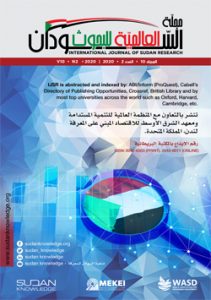Socio-Economic Impact of the Sudan war: A Critical Analysis of the Humanitarian Crisis and Development Challenges, Ibrahim Elnour, Tomador Mokhtar

 Ibrahim Bakri Elnour*
Ibrahim Bakri Elnour*
Department of Socioeconomics Studies, Environment and Natural Resources, and Desertification Research Institute
National Centre for Research
Sudan
ORCID: 0000-0002-0421-2583
 Tomador Muzamill Mokhtar
Tomador Muzamill Mokhtar
Department of Socioeconomics Studies, Environment and Natural Resources, and Desertification Research Institute
National Centre for Research
Sudan
ORCID: 0009-0008-7779-1804
Paper Type: Research
Received: 18 May 2025 / Revised: 18 August 2025 / Accepted: 19 August 2025 / Published: 20 August 2025
DOI: 10.47556/J.IJSR.13.1-2.2025.2
Purpose: This research aims to reflect the socio-economic impact of the war in Sudan, with recommendations, polices, and strategies of development in order to achieve the sustainable development goals (SDGs).
Research Methodology: The research is based on a literature review, including reports from international organisations, research articles, and policy briefs, as well as previous research findings on the socio-economic impact of the war in Sudan.
Limitations: This research is based on a review of existing literature and may not provide a comprehensive analysis of the socio-economic impact of the war in Sudan due to insecurity. Further research is needed to understand the effects of the war on socio-economics and to develop effective mitigation strategies.
Findings: The war in Sudan has led to a severe humanitarian crisis, with 150,000 people killed, 24.6 million facing acute food insecurity, and 20 million at risk of famine. Additionally, 8 million people have been displaced, with 4.5 million migrating to other countries. Crop production has decreased to 40% below the average of the previous five years, and Sudan’s GDP has decreased by US$15 billion in 2025 compared to US$33.7 billion in 2020.
Research Value: A critical analysis of the socio-economic impact of the war in Sudan highlights the need for mitigation methods to minimise food insecurity and sustain the family needs of affected people. The paper also recommends introducing income-generating units to support affected families.
Practical Implications: The findings of this research have practical implications for policy-makers, humanitarian organisations, and development agencies working in Sudan. It highlights the need for urgent action to address the humanitarian crisis and to support affected communities in addressing SDG 16 (Peace, Justice and Strong Institutions). The introduction of income-generating units can help to minimise food insecurity (SDG 2) and sustain the family needs of affected people to achieve SDG 8 (Decent Work and Economic Growth).
Keywords: Sudan War; Socio-economic Impact; Humanitarian Crisis; Food Security; Livestock; Development Challenges.
Citation: Elnour, I. B. and Mokhtar, T. M. (2025): Socio-Economic Impact of the Sudan War: A Critical Analysis of the Humanitarian Crisis and Development Challenges. International Journal of Sudan Research (IJSR), Vol 13, Nos. 1/2, pp. 25-xx.

